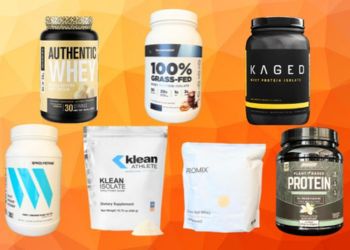Quick Summary
- Leucine is an essential amino acid that’s known for its ability to stimulate muscle protein synthesis.
- Some potential benefits of leucine include muscle growth and repair, blood sugar regulation, and athletic performance enhancement.
- You can meet your daily leucine requirements by consuming leucine-rich foods.
- Individuals who may benefit from additional leucine include older adults, athletes, or anyone with a goal of increasing muscle mass.
- Leucine supplements are available as L-leucine or as part of a BCAA, EAA, or protein powder supplement.
Table of Contents
Leucine Amino Acid
Leucine, sometimes called L-leucine, is an essential amino acid (EAA) that plays a critical role in various bodily functions, especially in muscle building and maintenance. This is an amino acid to pay attention to for those looking to build muscle mass. Unlike non-essential amino acids, our bodies cannot synthesize leucine, so it must be consumed through diet or supplements. Leucine is not the same as the amino acid isoleucine, although they sound similar. Leucine, like all other 20 amino acids the body needs, plays important roles in human physiology and can also provide additional benefits.
Leucine Health Benefits
Leucine is a branched-chain amino acid (BCAA), which is a group of three essential amino acids that are vital for protein synthesis, muscle repair, and muscle function. In fact, BCAAs make up approximately one third of muscle protein. Leucine is particularly popular among athletes and bodybuilders for its role in enhancing muscle growth and muscle recovery, but it’s essential in everyone’s diet. The benefits of leucine vary depending on age, physical activity level, health conditions, and more. Listed below are some of the most notable benefits of leucine:
- Stimulates muscle protein synthesis
- Maintains muscle mass and prevents muscle breakdown
- May support weight loss
- May help regulate blood sugar
- Supports athletic performance

Benefits of Leucine
Stimulates Muscle Protein Synthesis
Leucine is the most significant stimulator of muscle protein synthesis compared to other amino acids. Muscle protein synthesis (MPS) is the process of using protein to build muscle tissue. Often, this term is associated with athletes, but having adequate lean muscle mass is important for everyone.
Leucine’s crucial role in muscle growth relates to its ability to activate the mTOR pathway, which is an essential mechanism in MPS. In other words, leucine is the most anabolic amino acid, although all amino acids stimulate MPS to varying extents. This makes leucine a key player in muscle building. Those looking to improve muscle mass and/or alter their body composition may be particularly interested in leucine. Increased muscle mass can also lead to increases in muscle strength, although the two are congruent.
One systematic review found that consumption of leucine after exercise increased MPS in older adults, but not in younger adults. Leucine came from various sources, including protein supplements and protein-rich foods from both animal and plant protein sources.
It’s important to remember that muscle growth is stimulated by a number of factors including resistance exercise, adequate macronutrient and micronutrient intake, and quality sleep. Strength training and resistance training may be the most significant stimulator of MPS. An approach that addresses multiple factors of muscle growth will help optimize results.
Maintains Muscle Mass and Prevents Muscle Breakdown
Muscle isn’t only important for strength and movement. Muscle is essential for the structure and function of our organs and tissues. It helps us recover from injury and illness, and supports healthy functioning of our body systems. Skeletal muscle stores carbohydrates in the form of glycogen, which is especially useful when we need quick boosts of energy.
Not only does leucine stimulate MPS, but it can reduce the amount of muscle breakdown. This is most relevant to individuals with compromised MPS or increased risk of metabolic muscle breakdown, such as in older adults. Individuals experiencing high stress to the body, such as disease or trauma, may also have increased needs for protein and benefit from extra attention to leucine intake.
Sarcopenia is the breakdown of muscle either due to lack of stimulation through nutrients or exercise, health conditions, or aging. Age related muscle loss is one of the most common reasons for sarcopenia. One contributor to sarcopenia is a potential reduction in the body’s response to leucine. In populations more susceptible to muscle breakdown, such as older adults who have a blunted stimulation of MPS from food intake, leucine may help mitigate a portion of this discrepancy.
May Support Weight Loss
Leucine’s muscle-preserving effects may also be beneficial for individuals with a goal of weight loss. One study found that taking leucine supplements helped preserve fat free mass and lean tissue mass in men during a calorie deficit. In a calorie deficit, also known as an energy deficit, loss of muscle mass is more likely, especially if protein intake is low. Muscle loss decreases metabolic rate, can increase insulin resistance, and make it more difficult to lose fat.
All amino acids can be helpful for weight loss, especially BCAAs like leucine. They do this by increasing metabolic rate, supporting muscle growth and maintenance, appetite regulation, blood sugar management, and more.
Weight loss generally requires a multifaceted approach, so leucine alone likely won’t have a significant effect. However, combined with a healthy diet and lifestyle, leucine can positively benefit weight loss.
May Help Regulate Blood Sugar
There is some evidence from animal studies that suggests that leucine may influence blood sugar regulation by improving insulin sensitivity and stimulating insulin release from the pancreas. Although animal studies aren’t always indicative of human physiology, this provides some insight into further research for potential benefits of leucine. Leucine’s MPS benefits also support blood sugar regulation, since increased muscle mass increases the glucose uptake by muscles. This can be particularly beneficial for individuals with type 2 diabetes or those at risk of type 2 diabetes.
SupportsAthletic Performance
Leucine’s role in muscle protein synthesis translates to improved athletic performance. It aids in muscle protein synthesis, reduces muscle soreness, and enhances overall strength and endurance.
Of the three BCAAs, leucine has the highest oxidation rate, which means it’s metabolized quickly. Research suggests that consuming BCAAs containing 30-35% leucine prior to or during endurance activity may help mitigate the rate of protein degradation and help with psychological and physical exercise performance. It also was found to have a glycogen-sparing effect. However, supplementation of leucine alone did not find the same benefit. These effects may be more prominent in those who don’t regularly consume adequate amounts of leucine through diet who then increase to higher amounts.
What Are the Side Effects of Leucine?
While leucine is generally safe, excessive intake can lead to potential side effects, including nausea or dizziness. Other side effects may include insulin resistance and imbalances in amino acid levels, potentially affecting overall health. This is very unlikely to occur from food intake alone; the risk occurs with overconsumption of amino acid supplements, such as L-leucine, EAA, or BCAA supplements.
Some potential negative effects of leucine supplements may include decreased concentrations of other amino acids in the blood, such as valine and isoleucine. This is because the three BCAAs compete for the same enzyme for catabolism, called BCKA dehydrogenase. Too much leucine can interfere with availability of other amino acids like valine and isoleucine. This is why a balanced intake of amino acids is optimal.

Leucine Daily Dosage
Leucine needs will vary depending on individual factors such as personal goals, needs, and health conditions. There is a general recommendation per day, but it can vary between individuals. It’s important to remember that it’s possible to have too much of any nutrient, which also applies here.
Individuals with a goal to increase muscle mass and optimize exercise performance, such as athletes and bodybuilders, may benefit from more leucine. Another population who may benefit from higher leucine intake is older adults and individuals with certain health conditions that may reduce MPS. Infants, children, and adolescents have different protein and amino acid needs than adults.
Here are some general guidelines:
- Healthy adults: The World Health Organization recommends 39 mg/kg of bodyweight per day. The National Academies’ Health and Medicine Division’s Dietary Reference Intakes recommends slightly more, at 42 mg/kg of bodyweight per day. This is higher than any other essential amino acid. It’s important to note that this recommendation is for overall health needs, so there may be additional benefits from higher intake, such as for muscle gain. Generally, a daily leucine intake of 2-3 grams is considered safe and effective for most adults.
- Athletes: Athletes may benefit from higher amounts of leucine due to increased muscle repair and growth needs. The American College of Sports Medicine recommends that athletes consume between 1.2 to 2 grams of protein per kilogram of body weight per day. Given that leucine comprises a significant percentage of protein, especially in high-quality sources, this increases the leucine requirement. They suggest 45 mg/kg per day of leucine. Some sources suggest that athletes might benefit from as much as 2.5 to 3 grams of leucine per day to maximize muscle protein synthesis.
- Older adults: Recommendations from health authorities are the same as healthy adults, at 39-42 mg/kg per day, but evidence supports higher intakes to be beneficial for older adults. Elderly adults are recommended to aim for 25–30 grams of protein per meal, assuming three meals per day, with each meal containing three grams of leucine, according to one study. This recommendation is higher than that of younger adults to help prevent muscle mass loss associated with sarcopenia. Older adults may benefit from twice as much leucine per day than younger adults. This is due to a number of factors, such as reduced leucine absorption and reduced stimulus for MPS.
- Health conditions: Certain health conditions which contribute to muscle wasting, also called cachexia, often require increased protein needs. These conditions are associated with increased metabolism of BCAAs in the muscle, including leucine. Some examples are cancer, sepsis, liver cirrhosis, kidney failure, and trauma. While research isn’t yet conclusive whether leucine supplementation can improve muscle wasting, there may be a number of additional factors. Individuals with concerns about whether their health condition may improve with increased protein and leucine intake should speak with their health care provider.
Suggested Leucine Intake in Milligrams of Leucine per Kilogram of Body Weight Per Day
| Population | Suggested Quantity of Leucine Daily |
|---|---|
| Healthy Adults | 39-42mg/kg/day |
| Athletes | 45mg/kg/day |
| Older Adults | >39mg/kg/day |
| Certain Health Conditions | >39mg/kg/day |
If you’re focusing on increasing your consumption of leucine, you can start with consuming foods that are highest in leucine content per calorie, per gram of protein, and/or per serving size. You can also simply start with increasing your intake of protein-rich foods.

Leucine Supplements
Most foods that contain protein contain some amount of leucine, although some contain more than others. Leucine supplements come in various forms, including capsules, tablets, and powders. They can be a convenient way to ensure adequate intake, especially for athletes or individuals with dietary restrictions. A common approach to taking leucine supplements is through a BCAA or EAA supplement. These contain other amino acids in addition to leucine which can provide other benefits.
Most leucine supplementation research studies athletes and older adults, so there is less evidence on the impact of this supplement on other populations. Benefits of supplemental leucine are more likely when combined with strength training.
Consuming leucine by a nutritional supplement is not necessary in order to increase total leucine intake. The general population should be able to get enough from leucine-rich foods. Even athletes and older adults can increase their intake from foods alone.
Leucine and Plant-Based Diets
For those on a plant-based diet, getting adequate leucine without animal foods can be challenging but not impossible. Vegans and vegetarians are at higher risk for inadequate leucine intake, since many plant-based foods have an amino acid composition that is lower in leucine. Adequate leucine intake is possible by consuming enough total protein, a variety of protein sources, and sources high in leucine. All plants contain all 20 amino acids, but in different quantities. Some essential amino acids are low in some plant foods, such as leucine. Choosing plant foods that are high in leucine can help you meet your leucine needs. Some plant foods that contain higher amounts of leucine include soybeans, soy protein, tofu, lentils, navy beans, hemp seeds, and pumpkin seeds. In general, choosing a variety of protein-rich foods can help you meet your needs for leucine and other amino acids on a plant-based diet.

Food Sources of Leucine
Leucine is found in protein-rich foods such as meat, poultry, and fish. For vegetarians, vegans, or those who don’t eat animal products, sources include legumes, nuts, and seeds. Integrating a variety of these foods into your diet can help meet leucine requirements. Consuming a balanced diet with different protein sources supports adequate intake of all amino acids.
Note that when comparing nutritional content of foods, the context matters. Depending on which is most relevant to you, consider factors like leucine per serving size, per calorie, and per protein content of a food. See the table below for some of the highest food sources of leucine in common foods.
| Food | Serving Size | Total Leucine (g) | Total Protein (g) | Calories (kcal) |
|---|---|---|---|---|
| Protein powder, whey | 28 g (1 oz) | 2.1 | 22 | 106 |
| Chicken breast, without skin, uncooked | 100g | 1.9 | 23.3 | 100 |
| Soy beans, dry roasted | ½ cup (60g) | 1.9 | 23.7 | 271 |
| Soy protein isolate powder | 28 g (1 oz) | 1.9 | 25 | 95 |
| Tuna, yellowfin, uncooked | 100g | 1.9 | 24.4 | 109 |
| Greek Yogurt, 0%, plain | ¾ cup (184g) | 1.8 | 19 | 108 |
| Tofu, firm, uncooked | ½ cup (126 g) | 1.7 | 21.8 | 181 |
| Turkey breast, skinless, uncooked | 100g | 1.6 | 23.7 | 114 |
| Ground beef, 90% lean, uncooked | 100g | 1.6 | 20 | 176 |
| Egg whites | ½ cup | 1.2 | 13.5 | 63 |
| Lentils | 1 cup cooked | 1.3 | 17.9 | 230 |
| Egg white, dried | 1 oz | 1.9 | ||
| Navy beans, cooked | 1 cup | 1.7 | 19.7 | 296 |
| Cottage cheese, low fat 1% | 100g | 1.3 | 12.4 | 72 |
| Hemp seeds | 4 tbsp (40g) | 0.9 | 12.6 | 221 |
| Parmesan | 1 oz | 0.77 | ||
| Pumpkin seeds | 4 tbsp (1 oz) | 0.7 | 8.8 | 169 |
Data from the USDA Food Database and Canadian Nutrient File
Summary
Leucine is critical to optimal health and can have additional benefits in certain populations. It’s known for its ability to stimulate muscle protein synthesis. In general, if you’re consuming enough protein from a variety of sources, you’re likely consuming enough leucine and there’s no need for a dietary supplement. It’s often recommended to meet dietary leucine intakes through foods rather than supplements as foods also contain many other essential and beneficial nutrients. Don’t forget about the other amino acids, as they’re all important.
Frequently Asked Questions
What are the symptoms of a leucine deficiency?
Leucine deficiency can lead to symptoms like muscle wasting, fatigue, and impaired physical performance. In severe cases, it can contribute to metabolic disorders. However, leucine deficiency isn’t common on its own and is more likely to occur with a protein and/or calorie deficiency.
What is the best source of leucine?
The best sources of leucine include high-protein foods such as meats, dairy products, soybeans, and legumes. Leucine supplements are also available for those who might benefit from additional intake. It’s recommended to consume a variety of different protein-rich foods.
What does the amino acid leucine do?
Leucine is crucial for muscle protein synthesis, and it also plays a role in regulating blood sugar levels and enhancing physical performance. It’s essential in the diet for both muscle health and metabolic functions.
Is it wise to take leucine supplements?
Leucine supplements can be helpful for individuals with specific nutrition needs or sports goals, but they’re not necessary for the general population. You can meet your daily leucine needs by consuming adequate quantities of protein from a variety of sources. If you’d like to try a leucine supplement, it can be worth it to experiment and see if you find any benefit.














